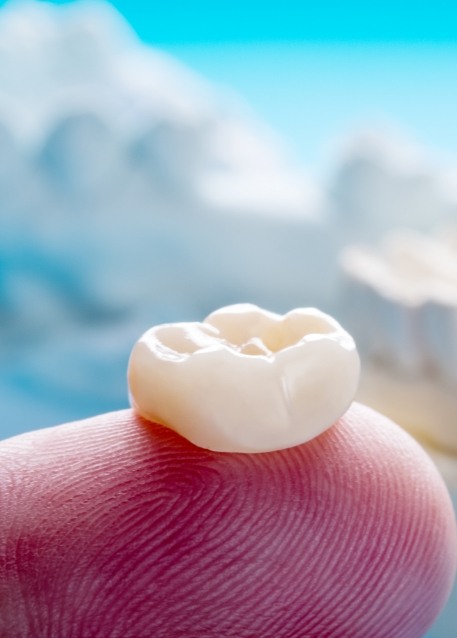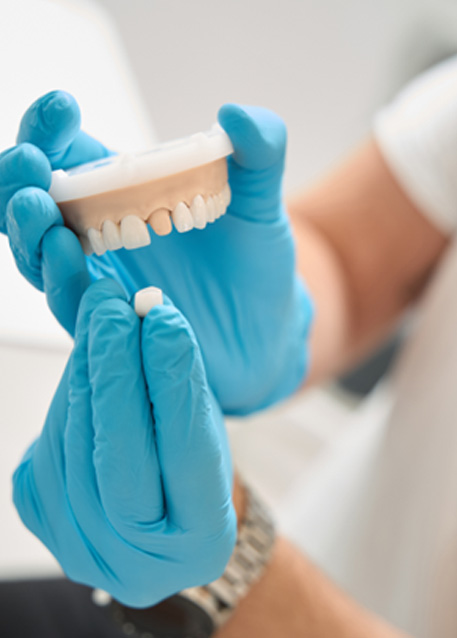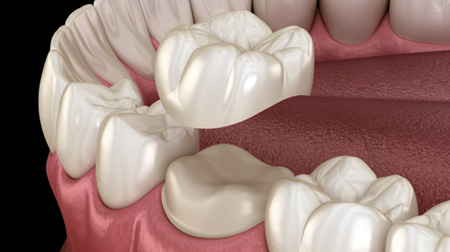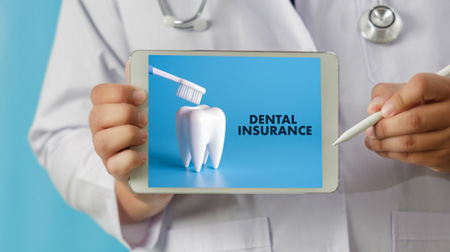When a tooth incurs damage or decay, our Tampa team wants to do everything in our power to preserve it! Doing so can spare you from a gap in your smile and prevent the need for costly tooth replacement. In order to help you maintain a complete set of teeth, we may recommend that you receive a dental crown. What are dental crowns, and how can they benefit you? Read this page to find out.
Dental Crowns Tampa
A Strong Fix for Damaged Teeth
Why Choose Advanced Dental Associates of Tampa Palms for Dental Crowns?
- Beautiful, Lifelike Materials that Stand the Test of Time
- Keep Your Natural Teeth for as Long as Possible
- State-of-the-Art Dental Office that Uses Digital Impressions
What Is a Dental Crown?

Dental crowns, also called caps, are a treatment designed to restore the strength, functionality, and appearance of teeth that have been broken or damaged by decay, disease, or injury. Crowns are custom made to fit your smile and are bonded over your original tooth to cover it and prevent further damage. If you are replacing a missing tooth, your crown may be placed atop a dental implant. This type of restoration is intended to be a long-lasting solution for your oral health and smile.
Dental crowns can be made of various materials, but in our office, we favor porcelain and other options that bear a strong resemblance to natural tooth enamel.
The Process of Getting a Dental Crown

The dental crown process takes place across two or more appointments.
During the initial visit, we will prepare your tooth by removing some of its enamel. This is important so that your crown will fit well and work in harmony with your natural bite. We use local anesthesia to keep patients comfortable during this process. Next, we take digital impressions so we can design your new restoration.
While a trustworthy laboratory fabricates your permanent crown, you will wear a temporary one. Once your permanent crown is ready, we will double-check that it meets our expectations before we bond it onto your tooth.
The Benefits of Getting a Dental Crown

As a result of getting a dental crown, you may experience several benefits:
- Improved dental function. A crown can improve your bite, reduce dental sensitivity, and increase the strength of damaged teeth.
- Improved appearance. By covering a damaged tooth, a crown can help your smile to look as beautiful as possible.
- Avoid tooth extraction. Whenever possible, we recommend that patients keep their natural teeth in order to enjoy optimum health.
- Long-lasting results. With proper care, a well-made dental crown has the potential to last for 10 – 15 years or longer.
- Easy maintenance. Caring for a dental crown is not complicated. Good oral hygiene, regular dental visits, and reasonable food choices are all important.
Understanding the Cost of Dental Crowns

The cost of dental crowns in Tampa is something your dentist will go over with you during your initial consultation. It cannot be determined how much you can expect to spend until we can meet with you to discuss the different aspects of receiving a custom crown. Since each case is unique, we will make sure you have all the details of your treatment plan as well as how you can prepare to cover the cost associated with your restorative care. Whether you plan to use your dental insurance, enroll in a flexible financing plan, or sign up for our in-house membership program, our team is here to make the process easy and efficient.
Factors That Affect the Cost of Dental Crowns

Part of your scheduled consultation will include reviewing the various factors that make up the proposed cost of your care. These include:
- The extent of the decay or damage that affects the tooth
- The type of materials that will be used to create your new crown
- Whether your crown will be created in-house or at an outside laboratory
- Whether additional treatment is required before receiving your dental crown (i.e., root canal treatment, etc.)
After capturing digital images and performing a visual examination, we will compile our findings to not only develop a comprehensive treatment plan but also establish the cost of care. When discussing these details with you during your initial visit, we will go over ways to maximize your available dental insurance as well as how you can lower any out-of-pocket fees.
Does Dental Insurance Cover Dental Crowns?

Most dental insurance companies do provide partial coverage for dental crowns. This is because they are considered a form of restorative treatment that is used to improve a person’s oral health. Although some dental crowns are designed with aesthetics in mind (a more lifelike appearance), they are still being used for restorative purposes, which means most dental insurance companies will help pay a portion of the total cost (up to 50%).
Other Options for Making Dental Crowns Affordable

If you do not have private dental insurance but do not want to forgo receiving a dental crown to protect your vulnerable tooth, there are other payment options available:
- Flexible Financing Through CareCredit or Lending Club: You can choose which third-party company matches your budget and needs. Each offers different payment plans at varying lengths and with little or no interest attached. This allows you to pay off your treatment over time.
- In-House Membership Plan: As an alternative to insurance, you can enroll in our in-house membership plan and avoid the red tape that is commonly associated with private PPOs. You can easily take care of your basic oral healthcare needs as well as receive discounts on all other available treatment options provided in our Tampa dental office.
Dental Crown FAQs
Are Dental Crowns Permanent?
Dental crowns may not be permanent in the sense that they’ll last forever, but they are considered a lifelong necessity. Unlike other parts of your body, your teeth aren’t able to repair themselves, so if they become severely damaged or structurally unsound, they’ll always need extra support and protection. Fortunately, our dental crowns in Tampa are durable and will last a long time with proper care. If you follow maintenance instructions, you won’t have to replace your restoration very frequently.
How Do You Know When a Dental Crown Needs to Be Replaced?
We can tell when a crown needs to be replaced with an X-ray or visual exam, but that doesn’t help you much when you’re at home! Here are some symptoms that can indicate it’s time to call our office for a new restoration:
- Pain or sensitivity – This could mean your crown needs to be readjusted, or that there’s decay underneath it that needs to be addressed.
- Looseness – Since we customize our dental crowns, yours should fit snugly. If it becomes loose or wiggly, give us a call so we can take a look before it falls off.
- Cosmetic blemishes – Daily wear and tear can contribute to discoloration, chipping, and other such cosmetic issues, in which case you may want a touch-up so you can smile confidently.
Are Dental Crowns Safe?
Yes, and crowns that are made from quality porcelain are even safer. The materials we use are non-toxic, and allergic reactions are extremely rare. Oftentimes, dental crowns prevent the teeth underneath from experiencing further harm or becoming infected, so you can rest easy with this restoration supporting your smile!
What’s the Difference Between a Temporary Crown and a Permanent Crown?
Customizing your crown takes time – usually about two weeks or so, to be precise. This is because we have to send your oral measurements and cosmetic preferences to a dental lab, where skilled technicians will carry out the work of fabricating your restoration. It wouldn’t be ideal to leave your tooth unprotected during this time, so we’ll provide you with a more generalized type of crown for temporary support. It won’t be as durable or cosmetically appealing as your permanent crown, but as long as you avoid overly hard and chewy foods, a temporary crown will shield your vulnerable tooth until we’re able to place the final product.
